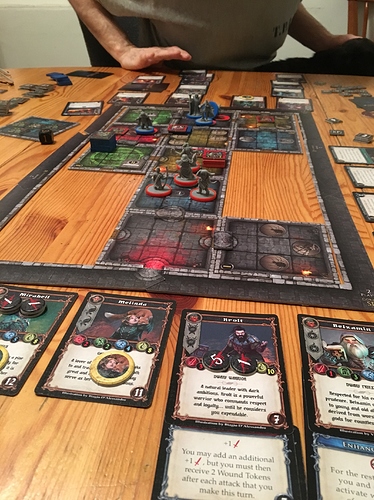I like Darkest Night (2nd Edition). I’ll go so far as to say I prefer it over Eldritch Horror when it comes to solo play experience. And I find that comparing Darkest Night to any other game in my collection, it scratches a similar itch to what Eldritch Horror does. I was interested in reading Tom’s review of the first edition where he compared the game up against Mage Knight and I find those comparisons just as relevant against Eldritch Horror. Where Eldritch Horror is brought down by bloat, Darkest Night fits into one box with a few discrete decks of cards. Darkest Night merrily takes up only half my table, less if I had a better option for storing the cardboard chits such as the blights, Eldritch Horror wants a lot of real estate for the various decks of cards that are called into play.
What I truly appreciate about Darkest Night however is the character development. With the various characters I’ve played so far (Prince, Knight, Ranger, Wizard, Mesmer, Seer, Paragon, Mercenary and Valkyrie) they’ve all had their own unique arcs to travel along, between characters and also between games thanks to the randomised nature of acquiring new skills. I find it superior to the Eldritch Horror method that gives every character one special action and a passive bonus, then essentially unleashes the randomness of the whole game upon them. Darkest Night finds that sweet spot, Eldritch Horror gives me 3 hours of hoping that maybe my soldier will find that double barrel shotgun that allows him to work to his strengths (or ultimately die). Because of the much tighter character development in Darkest Night, I would never see myself playing this with other people because some characters play too heavily in a support role. The Prince is one example where his whole turn might just be organising a meetup at some spot to then give another player on a subsequent turn the “Inspiration” ability. A great ability because that player gets to roll 3 extra dice, but pity the poor person whose whole engagement for 1-2 turns is to simply give a player a card so they can have some greater impact elsewhere.
One thing I do not like about Darkest Night is how it is pass/fail for everything. I appreciate the simplicity of chucking dice when it comes to considering odds of success. But it takes me away from the theme of the game. To quote a part of Tom’s review
“I can’t tell you whether the skeleton or the specter has combat 5 and elude 4. Whatever the case, the other one has combat 4 and elude 5. See? Theming.”
Simplistic dice chucking has in a sense taken me away from the light theme that surrounds the game. I feel like I’m not really fighting a Runed Golem event card, just a card that has a success of 5 on it for both fight and elude with a failure always becoming a wound (minus one grace). As an alternate example, one game, I had a blight from the start that meant my search check required a +1 to pass. So the mountains that require a search of 4 or higher now needed me to roll a 5. Destroying that blight was a high priority, needing only a 4 or higher to destroy I decided my valkyrie would be up to the task. Turn after turn, I’d roll to destroy that blight, every time she came up short. 4 goes it took to destroy, my other heroes were hindered in their searching as a result. When a second of those blights came out, you know I just had to walk away. And it was at that moment playing the game it occurred to me about how much this dice chucking ends up feeling like I’m shoveling shit up the hill in the game. Sometimes I think there needs to be a grey area in the game that gives some forward progression when the dice rolling is just not happening, and it is this only point where I’ll say that Eldritch Horror excels where the monsters and the rumours (to an extent) allow the heroes to chip away slowly. There is still complete failures that exist, but I never felt completely infuriated as opposed to my Valkyrie situation.
I do recommend Darkest Night. There’s a lot of game there if the price is right. The game itself is rife with many options to play when it comes to set up. 29 different heroes with their own quirks (plus a compendium that explains each hero quite well) map cards that influence what blights appear, tailored to beginners, or facing an undead horde or enduring the psychological stress and three sizable decks with quests, mysteries and artefacts, all of which enhance the game. Then adding in the difficulty modifiers and variants (eg: dual class variant) give a lot to explore.
